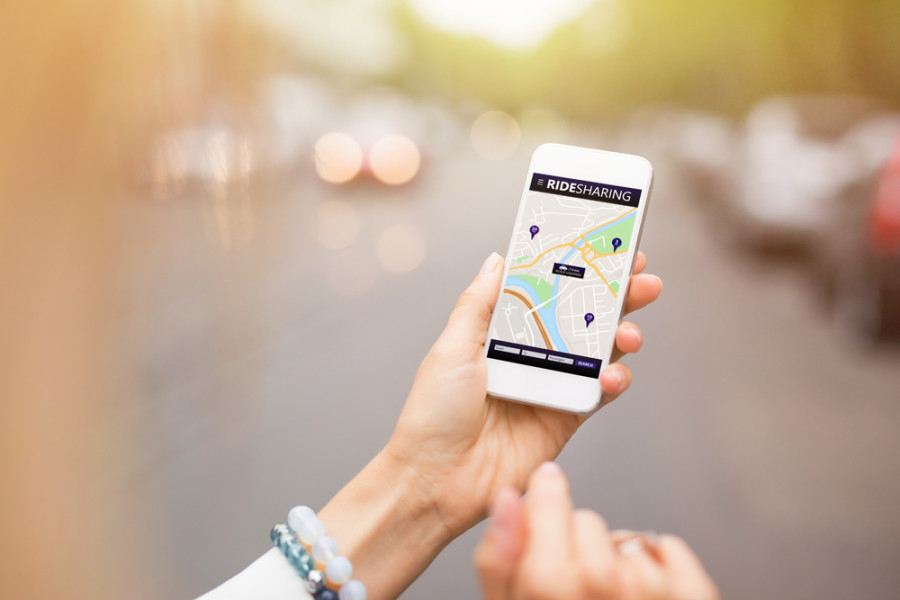Columns
Ridesharing apps solved out travel woes. But the government is not convinced
The government should adapt to changing times and accept app-based ridesharing services.
Manish Raj Kharel
Smart-phone applications now allow people to travel quickly and comfortably with the touch of a button. Thanks to innovations like Uber, Grab, Lyft and others, it has transformed the way people travel. In Kathmandu, finding a public with a seat is a real struggle on most days. If one has to ride a taxi, finding one which is willing to go to the destination without haggling often turns out an exercise in futility. But it was a ground-breaking move against traditional public transportation practices in Nepal when Sarathi and Tootle initiated the mobile app-based platform to bring travellers and motorists together. Being available easily and at an affordable price, ridesharing on two-wheelers has been a hit due to the narrow roads of Nepal overflowing with traffic and the inconvenient schedules and stops of public transportation. Since then, two-wheeler ridesharing services like Tootle and Pathao have been quite popular in Kathmandu.
The government started raising concerns over the legality of such mobile app-based platforms in January when Tootle and Pathao riders were penalised citing the non-legality of such business modules as per the Motor Vehicles and Transport Management Act 1993. The government had issued a notice to immediately stop any type of unregulated public transportation using vehicles bearing red number plates, saying they are only meant for private use. After that, nothing further was done as Prime Minister KP Sharma Oli seemed reluctant to take any action against Tootle and Pathao when the public criticised the government's move saying that the services were helpful and innovative.
Since then, the government has not done any homework or introduced new laws to regulate such transportation services. It has done nothing about the safety and insurance issues either, which were its primary concerns from the very beginning. Instead of working on a system to manage and regulate the ridesharing service and determine its legality, the Department of Transport Management issued another notice on November 20 banning the use of public vehicles for public transportation.
The government has not been able to decide how innovation and changing ideas can be integrated into public transportation despite being aware of tax evasion and the rider tracking system. A prudent strategy would have been to step in and update laws—not restrict innovation
The new app-based platform has played an important role in filling the gap in public transportation. It is competing against the traditional mode of transportation by offering better choices. The platform provides easy access to the rider's background and information and offers a choice to continue or look for other options—making it more consumer-friendly. Consumers are in much safer hands when ridesharing than when travelling on traditional means of transportation. When using conventional public transportation, it is not recorded where someone was picked up, neither does anyone know where you are going or where you are dropped off. But with our movement being tracked, these ride-sharing apps are much safer and transparent.
The tracking system being used can play an important role in controlling public transportation if basic standards are set. The Vehicle and Consignment Tracking System is a recent example where the software has played a major role in tracking shipments, thus minimising tax leakage with secured data. The government can approach ridesharing in a similar way, tracking each rider and setting minimum standards to be followed. The accurate data under the mobile app-based platform can also be helpful in tracking tax evasion and safety issues including insurance. These issues are mostly seen in the public transportation business in Nepal.
No doubt, ridesharing also provides an answer to rising traffic congestion in cities, and supporting such innovation will further protect individuals, make rides efficient and fulfil changing needs. With regard to the economy, the government should not focus on just innovation to create new things but concentrate on fostering consumer participation and experience. Instead of making these companies comply with old regulations, it needs to be updated to reflect the change in society for it is much easier to get in touch with a rider using an app on their phone, hop in, and get to the destination relatively faster and at a much cheaper rate.
Consumers always desire competition in the transportation industry which the two-wheeler mobile app-based platforms are providing. Tootle and Pathao are great examples of leveraging technological innovations and empowering entrepreneurship. Regulations promoting the safety and security of consumers should be a major concern of the government. It should be tilted towards consumer welfare instead of being diverted from reality and the needs of society. Implementing yesterday's regulation in today's high-speed technology will only limit pro-consumer innovation.
The mode of the service business is constantly evolving, and it is best for the state, business and consumers to allow ridesharing services with new reasonable standards for affirmative growth. There has to be swift changes in policymaking to solve the question of long-term driver—and rider—welfare. When growth like this receives general acceptance and has secure platforms for consumers to enjoy the service, the government should never be reluctant to adapt to such changes.
***
What do you think?
Dear reader, we’d like to hear from you. We regularly publish letters to the editor on contemporary issues or direct responses to something the Post has recently published. Please send your letters to [email protected] with "Letter to the Editor" in the subject line. Please include your name, location, and a contact address so one of our editors can reach out to you.




 20.12°C Kathmandu
20.12°C Kathmandu















